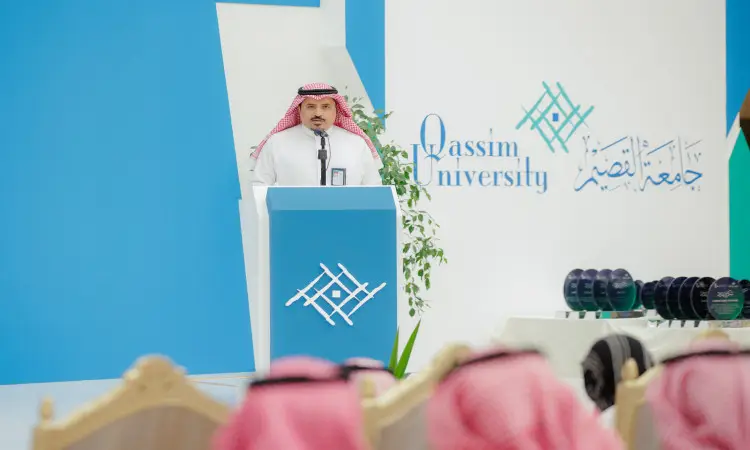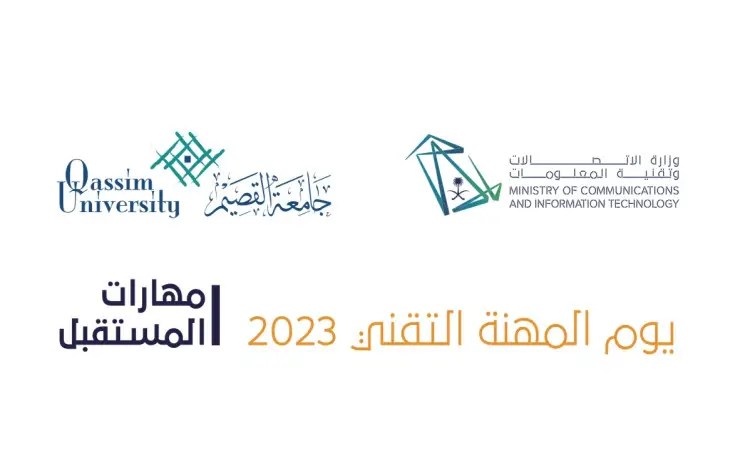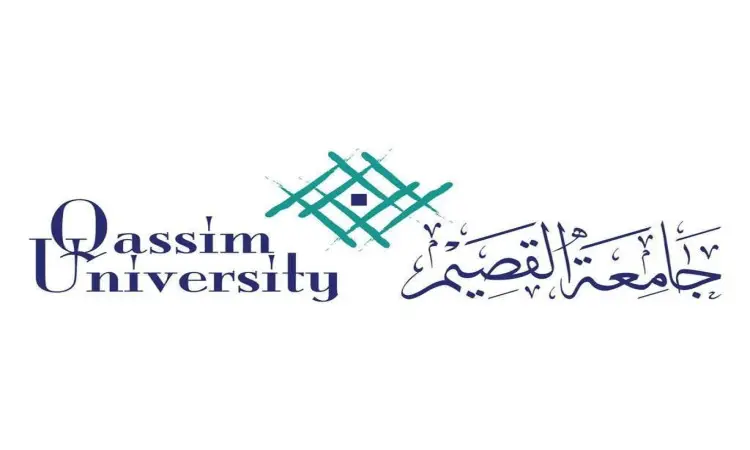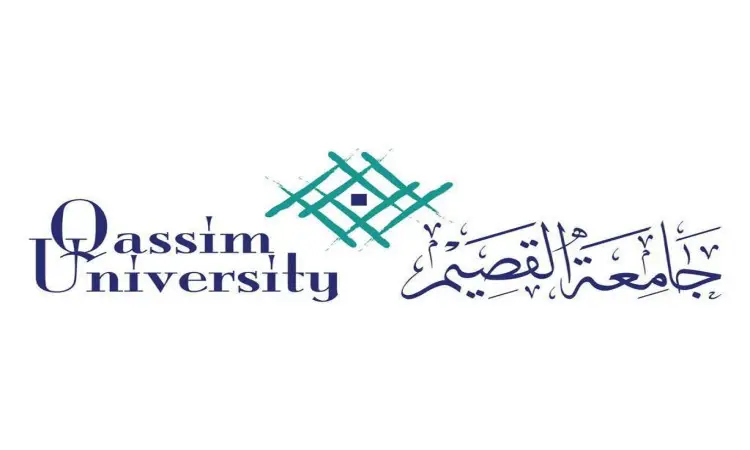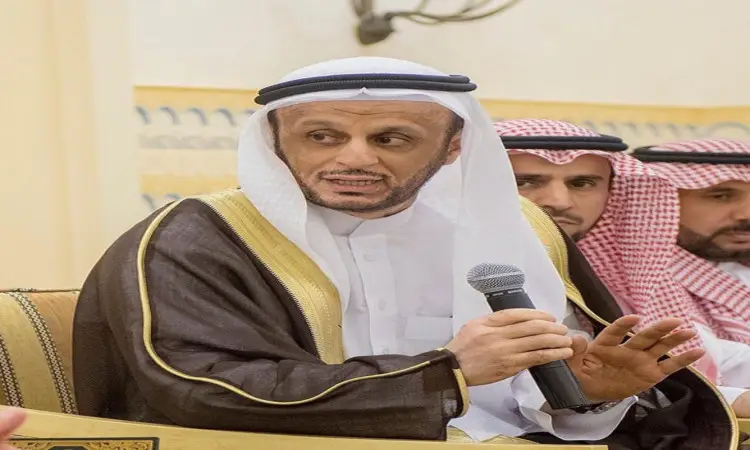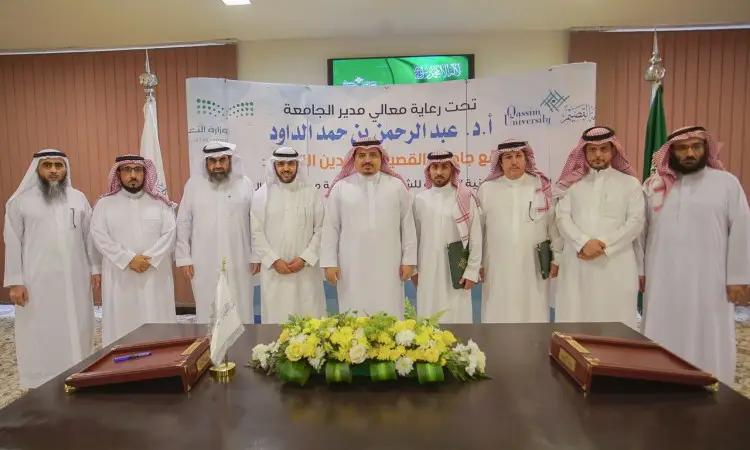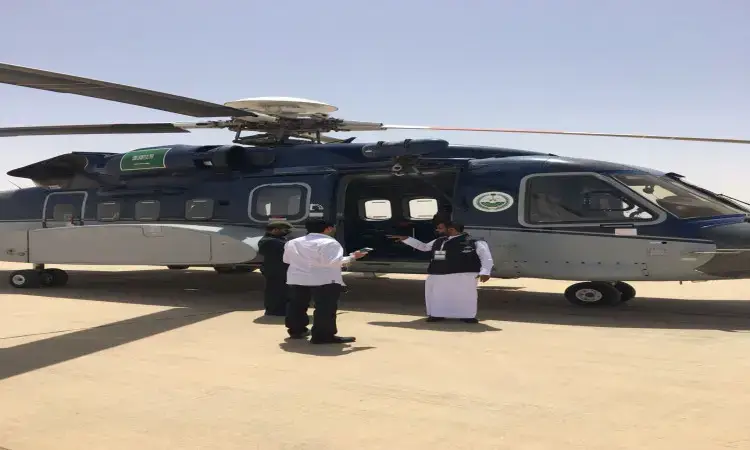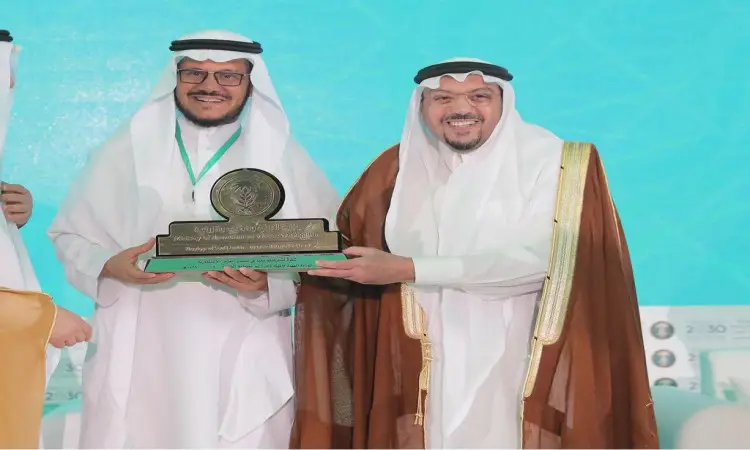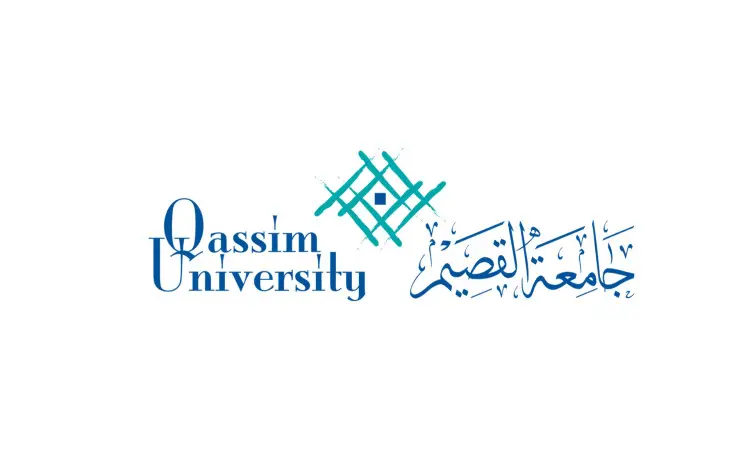- About SDG 6
- Water consumption per person
- Water usage and care
- Water reuse
- Water in the community
Water consumption per person
Water usage and care
Water in the community
Providing educational opportunities for local communities to learn about good water management
Utilizing sustainable water extraction technologies on associated university grounds on and off campus
SDG6: CLEAN WATER AND SANITATION
Qassim University's Commitment to SDG 6: Ensuring Clean Water and Sanitation through Water Conservation and Research
Sustainable Development Goal 6 (SDG 6) focuses on ensuring clean water and sanitation for all, recognizing the fundamental importance of access to safe and clean water resources. In Saudi Arabia, addressing water waste and ensuring sustainable water management is essential due to the region's arid climate.
Qassim University acknowledges the significance of SDG 6 and has embarked on initiatives to contribute to water conservation, efficient water use, and research on water resources.
Water Conservation Initiatives:
Qassim University's commitment to SDG 6 is evident through its water conservation initiatives. The university implements measures to reduce water consumption on its campus, such as installing water-efficient fixtures, using recycled water for non-potable purposes, and promoting water-saving behaviors among students and staff.
Research on Water Resources:
The university actively engages in research projects focused on water resources, quality, and management. Qassim University's research contributes to a better understanding of the challenges related to water availability, pollution, and efficient utilization in the region. This research informs policy decisions and promotes sustainable water management practices.
Promotion of Water-Efficient Technologies:
Qassim University promotes the use of water-efficient technologies through its curriculum and research initiatives. The university educates students about innovative technologies that reduce water waste, such as drip irrigation systems and smart water management solutions. This knowledge empowers future professionals to contribute to water conservation efforts.
Awareness Campaigns and Workshops:
The university organizes awareness campaigns, workshops, and seminars to educate students, faculty, and the community about the importance of water conservation and responsible water use. These initiatives raise awareness about the finite nature of water resources and the collective responsibility to conserve them.
Partnerships with Water Management Agencies:
Qassim University collaborates with local water management agencies, governmental bodies, and non-governmental organizations to jointly address water-related challenges. These partnerships facilitate knowledge sharing, research collaboration, and the development of strategies to improve water quality and availability.
Research on Water Treatment and Purification:
The university's research efforts extend to water treatment and purification technologies. Qassim University contributes to the development of effective and sustainable methods for treating wastewater, improving water quality, and ensuring that water resources remain safe for consumption and use.
Incorporation of Water Sustainability in Curriculum:
Qassim University integrates the principles of water sustainability into its curriculum. The university offers courses that cover topics such as water management, water quality assessment, and sustainable water use practices. This ensures that students across disciplines develop a comprehensive understanding of water-related challenges and solutions.
Community Engagement for Water Conservation:
The university engages with local communities through outreach programs that promote water conservation. Qassim University collaborates with schools, community centers, and local organizations to raise awareness, provide educational resources, and encourage water-saving behaviors among residents.
Qassim University's dedication to SDG 6 is evident through its holistic approach to addressing water waste, efficient water management, and research on water resources. By implementing water conservation measures, conducting research, promoting water-efficient technologies, raising awareness, fostering partnerships, and integrating water sustainability into education, the university plays a crucial role in ensuring clean water and sanitation in Saudi Arabia.
Through its commitment, Qassim University contributes to safeguarding this essential resource for current and future generations.
Goal-related news
His Excellency Prof. Abdulrahman bin Hamad Al-Dawood, President of Qassim University, stressed that the Technical Career Day contributes to facilitating the task of accessing the university's graduates to job opportunities, and undoubtedly serves them at the level of their working life and also serves the entities that attract such competencies. This came during the ceremony honoring the participating entities at the conclusion of the Technical Career Day, which [...]
2023-03-22
His Royal Highness Prince Dr. Faisal bin Meshal bin Saud bin Abdulaziz, Emir of Qassim Region, will inaugurate the activities of the "Technical Career Day" organized by Qassim University in partnership with the Ministry of Communications and Information Technology (MCIT) tomorrow, Monday, March 20, 2023, in the presence of His Excellency the Minister of Communications and Information Technology Engineer Abdullah bin Amer Al-Swaha, and His Excellency the University President Prof. Dr. Abdulrahman bin Hamad [...]
2023-03-19
The university achieved 153rd place globally and second place locally in the international sustainability ranking "Green Matrics" Green Matrics 2022, out of 1050 local and international universities, for its attention to the principles of comprehensive institutional and environmental sustainability academically, socially and economically, maintaining its advanced position globally in the ranking. This achievement emphasizes the continuity of the university's progress in various international rankings in a short period of time, [...]
2022-12-19
Qassim University has obtained a patent document from the Saudi Authority for Intellectual Property (SAIP) for the innovation of "a system and method for desalination using a halophyte plant", through a closed biological system that can convert highly saline water into distilled fresh water so that the system works naturally and can produce fresh water in commercial quantities. The research team led by Dr. Abdulaziz [...]
2022-09-27
As one of the largest universities in the Kingdom of Saudi Arabia, the university bears a national and societal responsibility towards the dear homeland with its wise leadership and loyal people. This national responsibility has led it to harness all its scientific and academic capabilities to serve the society of Qassim region in particular, and the Kingdom in general, from the angle of linking the research and academic community with the fields of production [...]
2021-04-06
The University, represented by the College of Agriculture and Veterinary Medicine, received a delegation from the Ministry of Environment, Water and Agriculture yesterday, Wednesday, 7/6/1442 A.H. The two parties held the second meeting to activate the memorandum of understanding between them to discuss cooperation in the fields of environmental conservation, then the delegation toured a number of colleges at the University City headquarters, including the College of Agriculture and Veterinary Medicine, the College of Engineering, the College of Science [...]
2021-01-21
The scientific sessions of the international conference "Prospects of Solar Energy in the Kingdom of Saudi Arabia: Applications and Challenges" organized by the University, represented by the College of Engineering, on its first day yesterday, Wednesday 24/4/1442 AH, discussed a number of themes, research and scientific studies with the participation of many academics and researchers in solar energy applications and industry experts in the Kingdom of Saudi Arabia and the world remotely. The first scientific session was held [...]
2020-12-10
His Excellency Prof. Dr. Abdulrahman bin Hamad Al-Dawood, President of the University, stressed that achieving environmental sustainability is one of the most important pillars of the Kingdom's Vision 2030, in order to raise the efficiency of waste management and reduce pollution, as the Kingdom is an active member of the international system, especially the G20 that seeks to achieve the UN Sustainable Development Goals, pointing out that the issue of waste management [...]
2019-11-05
Engineer Abdulmohsen Al-Furaihi, Director General of Water Services in Qassim Region, sent a letter of thanks to Prof. Dr. Abdulrahman bin Hamad Al-Dawood, President of the University of Qassim, for the university's cooperation through its cadres and specialized experts, which contributed to the support and success of the "Network Water Quality" conference, which was held under the patronage of His Royal Highness Prince Dr. Faisal bin Meshal bin Saud bin Abdulaziz, Emir of [...]
2018-10-28
His Excellency Prof. Abdulrahman bin Hamad Al-Dawood, President of the University, signed two contracts yesterday morning, Sunday 19/9/1439 A.H., for the implementation of several projects with a total value of more than 25 million riyals. The signed contracts included the project to complete the infrastructure of wireless networks, the project to implement the buildings of the wastewater treatment plant, the animal waste treatment plant at the research station and [...]
2018-06-04
The permanent team for the rehabilitation and development of Wadi Al-Rama organized a scientific expedition to the valley on Sunday, 27/8/1439 AH, as part of the rehabilitation and development plan for Wadi Al-Rama within the tasks carried out by the team under the guidance and support of His Royal Highness Prince Dr. Faisal bin Meshal bin Saud, and in cooperation with the university, where the scientific trip was well prepared and equipped to ensure the achievement of [...]
2018-05-15
The University, represented by the Sustainable Development Center, participated in the Investment Opportunities Forum, which was launched on Wednesday at King Khalid Civilization Center in Buraidah, under the patronage of His Royal Highness Prince Dr. Faisal bin Meshal bin Saud bin Abdulaziz, Governor of the Region, and in the presence of His Excellency the Minister of Environment, Water and Agriculture Engineer Abdulrahman Al-Fadhli. The Director of the Sustainable Development Center, Mr. Ibrahim Al-Rubadi, stated that the university participated in the [...]
2018-05-02
His Excellency the President of Qassim University, Prof. Dr. Khaled bin Abdulrahman Al-Hamoudi, expressed his sincere condolences to the Custodian of the Two Holy Mosques King Salman bin Abdulaziz Al Saud, His Royal Highness Prince Muqrin bin Abdulaziz Al Saud, Crown Prince and Deputy Prime Minister, and His Royal Highness Prince Mohammed bin Nayef bin Abdulaziz, Deputy Crown Prince and Second Deputy [...]
2015-01-29
Goal-related tweets
Goal-related files
2025-10-23
2025-10-23
Qassim Water Treatment



Apart from the supplied water treatment plant & pump sta – tion. The sewage treatment plant of average capacity equals to 5250 m3/d & can be extended to a maximum capacity up to 13125 m3/d. It consists mainly of two treatment streams, each stream of 2625 m3/d capacity; using a very convenient treatment method called RBC (Rotating Biological Contractors). The wastewater treatment plant is designed to treat the wastewater that coming from the different facilities inside the university. Suspended solids and biodegradable organic matter are reduced through the treatment system to the acceptable limit for irrigation.
Executive Summary of April 2022

10,354 cubic meters of sewage water were drained into the facilities and buildings of the university city and transported across 21 substations to the main station to be processed triple via the antenna rotation system without any stoppage

Water Plant Operation and Maintenance Section

Searching for sustainable solutions for Saudi Arabia
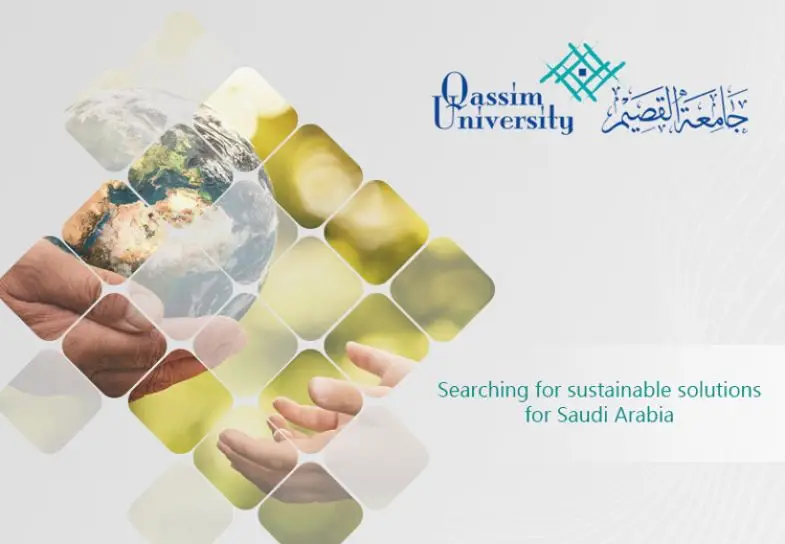
Researchers at Qassim University are using the latest technologies to find sustainable power sources and environmentally friendly water management techniques From turning date palm tree waste into renewable energy to harnessing the power of the sun, Qassim University is on a mission to find sustainable power solutions. Investigating sustainable developments in energy, water and environmental engineering is one of the university’s 10 priorities, set out in its 2020 to 2024 research strategy. Sustainable technologies are crucial in Saudi Arabia, where wastewater, municipal and construction waste and air pollution pose environmental threats. The Saudi Vision 2030 has set a target to power half the country with renewable resources by 2030. Qassim University is working on a host of solutions, from sludge management and waste recycling to sea and groundwater desalination. One notable project, led by Professor Sulaiman Alyahya, is examining how this waste from date palm trees can be transformed into renewable energy. The central Al-Qassim province has more than 8 million date palm trees. The trees produce a large amount of agricultural waste including dry leaves, stems and seeds. “A quarter of the date palm is waste and many of the farmers burn that waste, which of course produces CO2 emissions and harms the environment,” says Alyahya. “We are really concentrating on how to convert this waste to energy.” An international group of researchers, including scientists from Iowa State University, is investigating how the latest technologies can turn the waste into renewable energy forms like biomass, bio-oil and biogas. The researchers are using the new technique of autothermal pyrolysis, developed by Iowa State University’s Bioeconomy Institute. The process is simpler and cheaper than conventional pyrolysis and does not require an external energy source. “If we achieve this goal to convert the waste of date palms into energy, Saudi Arabia will have a reduction of almost 8,000 tonnes of CO2 emissions,” says Alyahya. “We will stop burning the waste of agriculture and at the same time create richer products.” Solar power research is another focus for Qassim University. Dr Muhannad Alaraj, an assistant professor in the university’s Department of Electrical Engineering, is exploring how photovoltaic panels can transform light into power. “We are investigating the economic effectiveness of PV panels in the Al-Qassim region. We’re also studying the effect and forecasting for those PV panels and we currently have a small PV system from which we are collecting the data,” says Alaraj. “We have to consider the weather conditions and meteorological parameters. This is really important because in our region we have mostly sunny days, but sometimes there are sandstorms or clouds. We are trying to see the effect of this weather on PV panels. This will be really helpful to build a model to predict or estimate how much power or energy we will get from this PV panel each day.” As one of the world’s most water-scarce nations, Saudi Arabia also needs innovative ideas for renewable water sources. Dr Saleem AlSaleem, from the College of Engineering, is working on water and wastewater treatment, such as greywater treatment and using solar energy to treat saline water. His team is also developing solutions for solid waste management and tackling noise pollution. AlSaleem is a member of the university’s Sustainable Development Centre, which oversees Qassim’s progress in its sustainability initiatives. The centre runs four greening projects, focusing on the curriculum, the campus, research and the university as an organisation. AlSaleem and his colleagues say collaborating within and outside the university is important for a successful research project. Qassim’s scientific research deanship has launched a number of international cooporation grants and encourages faculty members to apply. “We can improve our work by encouraging collaboration,” says AlSaleem. “I am working with water companies and municipalities inside Saudi Arabia, and we also collaborate with researchers outside the country. For example, I am working with one professor in Malaysia and another in Italy.” The university’s future research into sustainable developments will be boosted by a recently announced research chair for artificial intelligence. The chair will fund studies into AI across the university, including in agriculture and engineering. “I’m currently working with five teams to see the role artificial intelligence can play in agriculture and renewable energy,” says Alyahya.
Network Water Quality Conference in Buraidah continues its activities
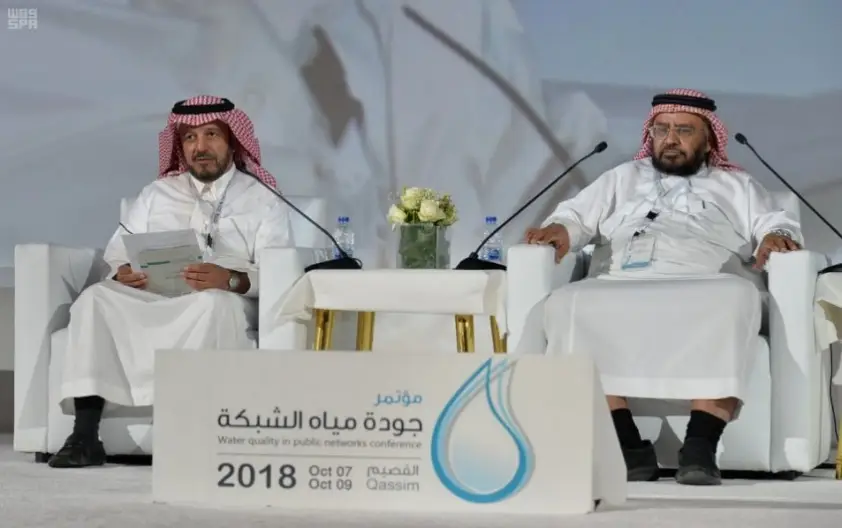
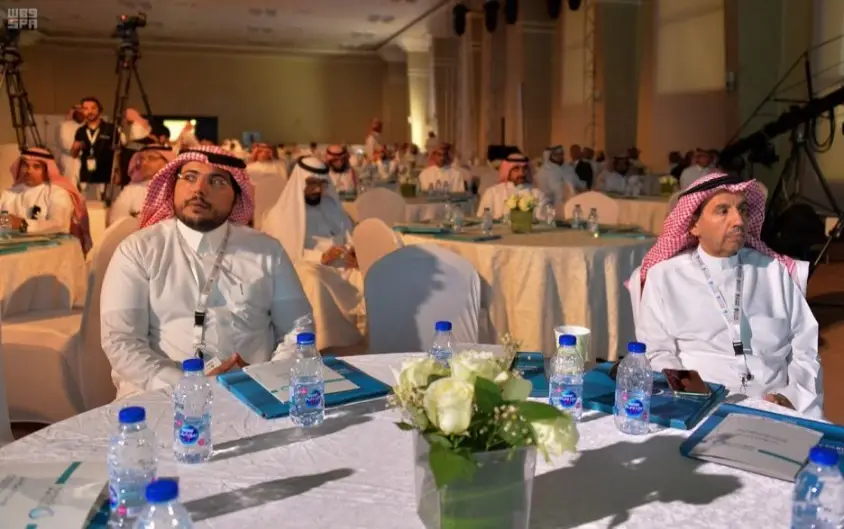
The Network Water Quality Conference continued its activities today, at the King Khalid Cultural Center in Buraidah, where three dialogue sessions were held that included 8 working papers. The first session, chaired by the Vice President of Qassim University for Graduate Studies and Scientific Research, Dr. Ahmed Al-Turki, discussed three working papers on the first of which came under the title “Quality of groundwater” by Dr. Hussein Al-Ajmi Groundwater, where he explained that it constitutes approximately 98% of fresh water and constitutes almost 60% of the sources of drinking water supply projects in the Kingdom, while the second paper was entitled “Plastic pipes used for drinking water in networks and homes” in which Engineer Turki Al-Shahrani talked about the advantages of plastic pipes and that they Environmentally friendly, while Dr. Ahmed Al-Arifi presented the third paper entitled “Desalination Industry in the Kingdom of Saudi Arabia” in which he touched on the water challenges facing the Kingdom and the history of the desalination industry and some statistics locally and globally. The second session, chaired by the Director General of the Water Regulation Department at the Ministry, Dr. Abdulaziz Al-Shuaibi, discussed three working papers, the first of which dealt with “Promising desalination methods” presented by Dr. Ibrahim Al-Mutaz, in which he explained that there are techniques still in the process of experimentation such as desalination by the process of humidification, dehumidification, desalination by freezing method and others, and the second paper discussed the topic of “Optimal design of water purification plants to reduce waste from wastewater” by Dr. Mohammed Heikal, in which he explained that water purification plants produce daily quantities of The third paper was entitled “Specifications of transported water and its impact on the shelf life of transport systems and their reflection on the quality of water arriving to the consumer” presented by Dr. Saud bin Murshid, in which he highlighted the operational technical specifications applied to the transport systems of sweet water in the Kingdom. The third session, chaired by Dr. Bader Al-Baridi, former Director of Studies and Designs Department at the General Directorate of Water in Qassim, dealt with two working papers, the first of which discussed the topic of “Protection of buried carbon iron pipes used in the transport of water from corrosion”, in which Eng. Hamad Ababtain spoke about the importance of protecting carbon iron pipes because it is the nerve of the project to continue serving as long as possible, while the second and last paper in this session was presented by Dr. Ali Al-Hamza entitled “Monitoring of organic and inorganic pollutants in the water produced.” From the plants of the Saline Water Desalination Corporation” in which he pointed out that the World Health Organization’s standard specifications for drinking water showed the results that organic and inorganic pollutants in the water produced from desalination plants are within the limits allowed by the World Health Organization.
References
[1] [Online]. Available: .https://wetico.com/?project=qassim-university
[2] [Online]. Available: .https://www.timeshighereducation.com/hub/p/searching-sustainable-solutions-saudi-arabia
[3] [Online]. Available: .https://www.spa.gov.sa/1823762
- About SDG 6
- Water consumption per person
- Water usage and care
- Water reuse
- Water in the community

